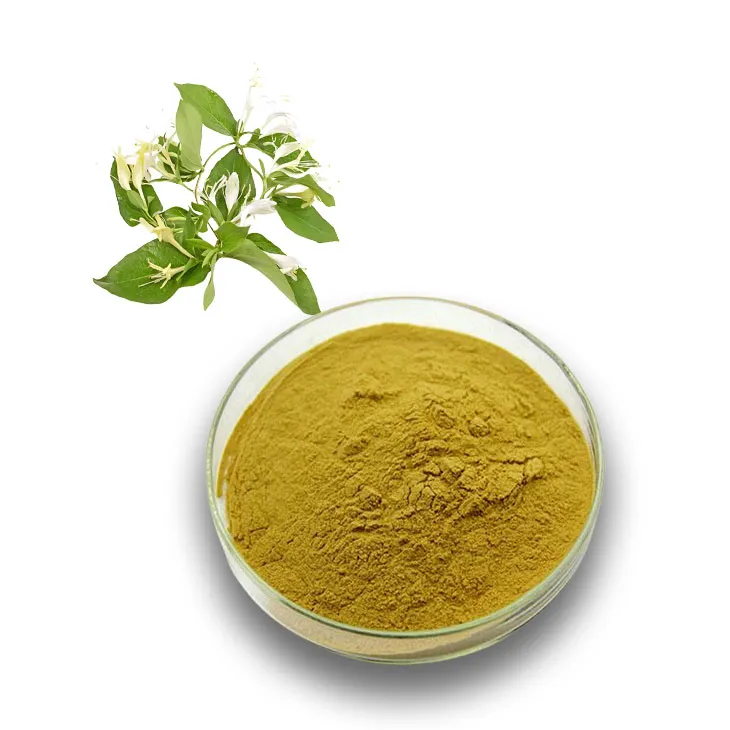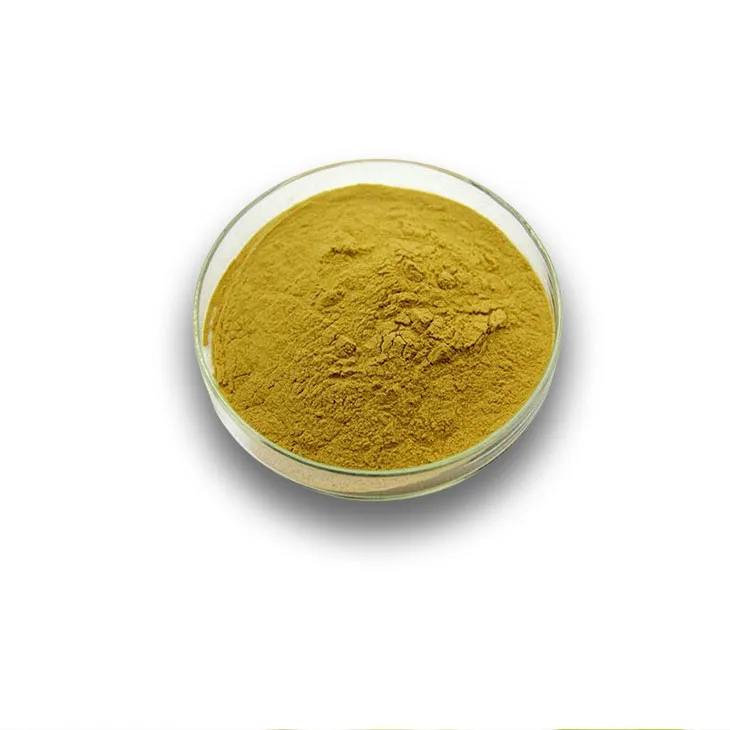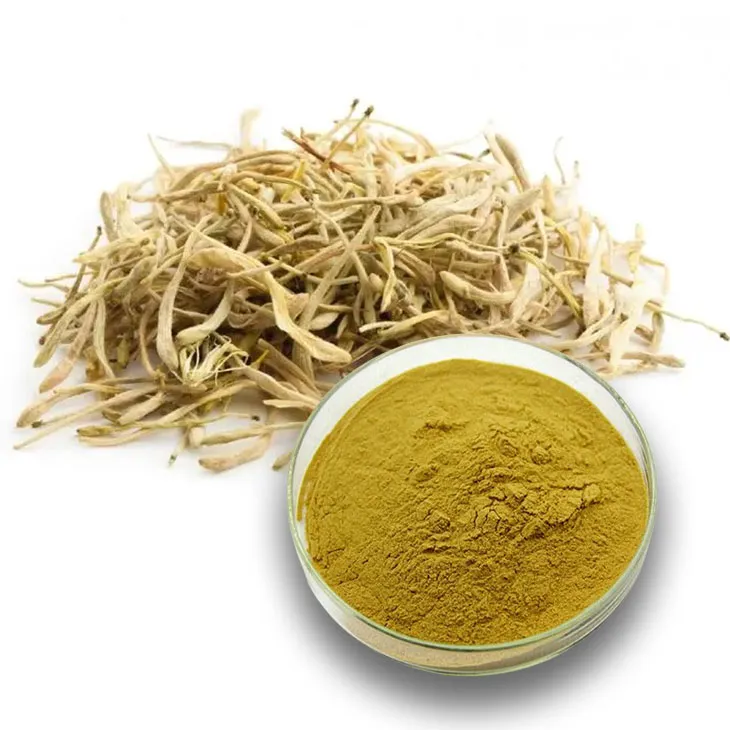- 0086-571-85302990
- sales@greenskybio.com
Honeysuckle pollen: What are its benefits and how to take it?
2024-11-13

1. Introduction
Honeysuckle Pollen has been increasingly recognized for its potential health - promoting properties. It is a natural product that offers a variety of benefits, and understanding how to use it properly can enhance our well - being. In this article, we will explore the benefits of Honeysuckle Pollen in detail and also provide guidance on its proper intake methods.

2. Benefits of Honeysuckle Pollen
2.1 Antioxidant Properties
One of the most significant benefits of honeysuckle pollen is its antioxidant properties. Antioxidants play a crucial role in maintaining our health by combating free radicals. Free radicals are unstable molecules that can cause damage to our cells, leading to various health problems such as premature aging, certain diseases, and a weakened immune system.
Honeysuckle pollen contains a range of antioxidant compounds, including flavonoids, phenolic acids, and carotenoids. These compounds work together to neutralize free radicals, reducing their harmful effects on the body. By regularly consuming honeysuckle pollen, we can potentially enhance our body's antioxidant defenses, which may contribute to overall better health and a reduced risk of chronic diseases.
2.2 Digestive Health
Honeysuckle pollen may also have positive effects on digestive health. It contains dietary fiber, which is essential for maintaining a healthy digestive system. Fiber helps to regulate bowel movements, preventing constipation and promoting regularity.
Furthermore, honeysuckle pollen may have prebiotic properties. Prebiotics are substances that feed the beneficial bacteria in our gut, known as probiotics. By promoting the growth of these good bacteria, honeysuckle pollen can help to improve the balance of the gut microbiota. A healthy gut microbiota is associated with better digestion, enhanced nutrient absorption, and a strengthened immune system.
2.3 Immune System Support
The antioxidant and prebiotic properties of honeysuckle pollen may also contribute to immune system support. A strong antioxidant defense helps to protect immune cells from damage, allowing them to function effectively. Additionally, a balanced gut microbiota is crucial for a healthy immune response, as a large portion of the immune system is located in the gut.
Honeysuckle pollen may also contain certain nutrients and bioactive compounds that directly stimulate the immune system. For example, it may contain vitamins, minerals, and amino acids that are involved in immune function. By consuming honeysuckle pollen, we may be able to boost our immune system and reduce the risk of infections and diseases.
2.4 Anti - inflammatory Effects
Chronic inflammation is associated with many health problems, including heart disease, diabetes, and arthritis. Honeysuckle pollen may have anti - inflammatory effects, which can help to reduce inflammation in the body.
The antioxidant compounds in honeysuckle pollen may play a role in reducing inflammation by neutralizing free radicals that can trigger the inflammatory response. Additionally, some of the bioactive compounds in honeysuckle pollen may directly interfere with the inflammatory pathways in the body, reducing the production of inflammatory mediators.
2.5 Skin Health
The antioxidant and anti - inflammatory properties of honeysuckle pollen can also benefit skin health. Free radicals and inflammation can cause damage to skin cells, leading to premature aging, wrinkles, and skin disorders.
By consuming honeysuckle pollen, we can potentially reduce the damage caused by free radicals and inflammation, resulting in healthier, more youthful - looking skin. Honeysuckle pollen may also contain nutrients that are beneficial for skin health, such as vitamins A, C, and E, which are important for maintaining skin elasticity and promoting skin repair.

3. How to Take Honeysuckle Pollen
3.1 Raw Consumption
One way to take honeysuckle pollen is in its raw form. However, it is important to ensure that the pollen is sourced from a clean and unpolluted environment. Raw honeysuckle pollen can be eaten directly, but it has a slightly sweet and floral taste that may not be appealing to everyone.
It is recommended to start with a small amount, such as a quarter to half a teaspoon, and gradually increase the dosage over time. This allows the body to adjust to the pollen and helps to avoid any potential adverse reactions.
3.2 Incorporating into Food and Drinks
Honeysuckle pollen can be easily incorporated into various food and drinks. For example, it can be added to smoothies, yogurt, or oatmeal for an extra nutritional boost. When adding honeysuckle pollen to food or drinks, it is important to stir it well to ensure even distribution.
Another option is to make a honeysuckle pollen tea. Simply steep a teaspoon of honeysuckle pollen in hot water for a few minutes, and then strain and drink. This can be a refreshing and healthy beverage option.
3.3 Supplements
If raw pollen or incorporating it into food and drinks is not convenient, honeysuckle pollen supplements are also available. These supplements are typically available in capsule or powder form.
When choosing a supplement, it is important to look for a high - quality product from a reputable manufacturer. Check the label for information on the purity, dosage, and any additional ingredients. Follow the recommended dosage instructions provided on the label, and consult a healthcare professional if you have any underlying health conditions or are taking other medications.

4. Precautions
While honeysuckle pollen has many potential benefits, there are also some precautions to keep in mind.
- Allergic Reactions: Some people may be allergic to honeysuckle pollen. If you have a history of allergies, especially to pollen or other plant - based products, it is important to be cautious when trying honeysuckle pollen. Start with a very small amount and monitor for any signs of an allergic reaction, such as itching, swelling, or difficulty breathing. If you experience any allergic symptoms, discontinue use immediately and seek medical attention.
- Quality and Source: Ensure that the honeysuckle pollen you consume is of high quality and sourced from a reliable source. Poor - quality pollen or pollen that has been contaminated may pose health risks.
- Overconsumption: As with any natural product, overconsumption of honeysuckle pollen may lead to adverse effects. Stick to the recommended dosages and do not exceed them without consulting a healthcare professional.

5. Conclusion
Honeysuckle pollen offers a range of potential health benefits, from antioxidant and anti - inflammatory effects to support for digestive health and the immune system. There are several ways to take honeysuckle pollen, including raw consumption, incorporating it into food and drinks, or using supplements.
However, it is important to be aware of the precautions, such as the potential for allergic reactions and the importance of quality and proper dosage. By understanding the benefits and proper intake methods of honeysuckle pollen, we can make informed decisions about whether to include it in our diet for the promotion of our overall health and well - being.
FAQ:
What are the main antioxidant components in honeysuckle pollen?
Honeysuckle pollen contains flavonoids and phenolic compounds which are the main antioxidant components. These substances can effectively scavenge free radicals in the body, reducing oxidative stress and protecting cells from damage.
How does honeysuckle pollen contribute to digestive well - being?
Honeysuckle pollen may contribute to digestive well - being in several ways. It can potentially regulate the intestinal flora, promoting the growth of beneficial bacteria and inhibiting the growth of harmful bacteria. Also, it may have a certain effect on improving intestinal peristalsis, which helps in better digestion and absorption of food.
Is there any side effect when taking honeysuckle pollen?
Although honeysuckle pollen has many benefits, some people may be allergic to it. Allergic reactions can include symptoms such as skin rashes, itching, swelling, and in severe cases, difficulty breathing. Therefore, it is recommended to do a small - scale test before taking it for the first time.
Can honeysuckle pollen be taken by pregnant women?
Pregnant women should be cautious when considering taking honeysuckle pollen. While there is no conclusive evidence that it is harmful, it is always best to consult a doctor first. Due to the physiological changes during pregnancy, the body may be more sensitive to certain substances, so it is necessary to ensure safety.
How much honeysuckle pollen should be taken per day?
The appropriate dosage of honeysuckle pollen can vary from person to person. Generally, it is recommended to start with a small amount, such as 1 - 2 grams per day, and then gradually increase the dosage according to individual tolerance. However, it is crucial not to exceed a reasonable limit, and it is advisable to consult a healthcare professional for personalized advice.
Related literature
- The Nutritional and Medicinal Value of Honeysuckle Pollen"
- "Honeysuckle Pollen: Composition and Health - Promoting Effects"
- "Studies on the Safe Intake of Honeysuckle Pollen"
- ▶ Hesperidin
- ▶ Citrus Bioflavonoids
- ▶ Plant Extract
- ▶ lycopene
- ▶ Diosmin
- ▶ Grape seed extract
- ▶ Sea buckthorn Juice Powder
- ▶ Fruit Juice Powder
- ▶ Hops Extract
- ▶ Artichoke Extract
- ▶ Mushroom extract
- ▶ Astaxanthin
- ▶ Green Tea Extract
- ▶ Curcumin
- ▶ Horse Chestnut Extract
- ▶ Other Product
- ▶ Boswellia Serrata Extract
- ▶ Resveratrol
- ▶ Marigold Extract
- ▶ Grape Leaf Extract
- ▶ New Product
- ▶ Aminolevulinic acid
- ▶ Cranberry Extract
- ▶ Red Yeast Rice
- ▶ Red Wine Extract
-
Artichoke Leaf Extract
2024-11-13
-
Black Rice Extract
2024-11-13
-
Kupilu Extract
2024-11-13
-
Apricot Powder
2024-11-13
-
Maca Extract
2024-11-13
-
Mangosteen extract powder
2024-11-13
-
Europen Bilberry Extract
2024-11-13
-
Passionflower Extract
2024-11-13
-
Grape Leaf Extract
2024-11-13
-
Lotus leaf extract
2024-11-13





















